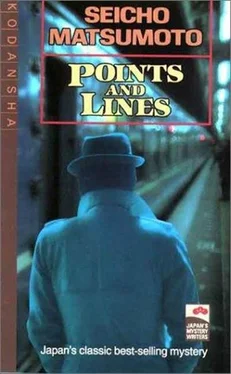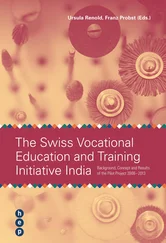Seichō Matsumoto - Points And Lines
Здесь есть возможность читать онлайн «Seichō Matsumoto - Points And Lines» весь текст электронной книги совершенно бесплатно (целиком полную версию без сокращений). В некоторых случаях можно слушать аудио, скачать через торрент в формате fb2 и присутствует краткое содержание. Жанр: Детектив, на английском языке. Описание произведения, (предисловие) а так же отзывы посетителей доступны на портале библиотеки ЛибКат.
- Название:Points And Lines
- Автор:
- Жанр:
- Год:неизвестен
- ISBN:нет данных
- Рейтинг книги:5 / 5. Голосов: 1
-
Избранное:Добавить в избранное
- Отзывы:
-
Ваша оценка:
- 100
- 1
- 2
- 3
- 4
- 5
Points And Lines: краткое содержание, описание и аннотация
Предлагаем к чтению аннотацию, описание, краткое содержание или предисловие (зависит от того, что написал сам автор книги «Points And Lines»). Если вы не нашли необходимую информацию о книге — напишите в комментариях, мы постараемся отыскать её.
Points And Lines — читать онлайн бесплатно полную книгу (весь текст) целиком
Ниже представлен текст книги, разбитый по страницам. Система сохранения места последней прочитанной страницы, позволяет с удобством читать онлайн бесплатно книгу «Points And Lines», без необходимости каждый раз заново искать на чём Вы остановились. Поставьте закладку, и сможете в любой момент перейти на страницу, на которой закончили чтение.
Интервал:
Закладка:
She had suddenly come alive, her face radiant. "What will you have?" she asked, looking at him eagerly.
"Coffee."
He gave the order to the waitress, "Have you been waiting long?" He was smiling at her.
"About forty minutes. Too long for one cup of coffee, so I ordered a cup of tea too."
"I'm sorry." He looked apologetic. "The bus was a long time coming. They're so irregular on that line. They can be as much as twenty minutes late. It's very annoying."
"Since the bus is to blame I have nothing to say." She looked at her watch. "The show has already started. Let's hurry."
Mihara listened idly to their conversation. There was nothing unusual about it. In the time it took him to light a cigarette the young man had sipped a mouthful of coffee and was on his feet. Mihara settled back and relaxed. Their cups were still on the table, one only half empty. The young man must live in the outskirts if the bus schedules were so irregular, Mihara was thinking. His mind, unconcerned for the moment with his own problems, was filled with idle thoughts.
No, not entirely idle. Mihara came to with a start. An idea had suddenly entered his mind. Yasuda did not have Kawanishi meet him on the railway platform at Sapporo; in his telegram he clearly indicated the waiting room of the station because he feared the plane might be delayed by bad weather.
Mihara stared at the painting on the wall, as if afraid to move. Since Yasuda planned to arrive by the Marimo, it would have been more effective to have Kawanishi meet him on the platform. That he did not have him do so was because planes are often delayed by the weather. Had the plane been seriously delayed, he would not have had time to travel from Sapporo to Otaru and catch the Marimo there. And if he were not on the Marimo and Kawanishi had come to meet him on the platform, it would be obvious he had not arrived by train. A very cautious Yasuda had foreseen this possibility and in his telegram had asked Kawanishi to meet him in the waiting room.
Mihara's eyes brightened with the joy of discovery. This is it, he thought. Yasuda's devious plan has only served to reveal that he actually used a plane.
He left the coffee shop feeling unusually elated. Outside, the sun was bright and inviting.
But wait a moment, he said to himself. From where did Yasuda send that telegram?
Mihara decided to check again on Yasuda's trip to Hokkaido. He had played tricks on that trip, which showed he had expected to be investigated. The encounter with the Hokkaido governmerit official on the train was one, but the most obvious was the request for Kawanishi to meet him at Sapporo Station. Kawa-nishi had admitted the business was not urgent and there was no need for him to go to the station. From where did Yasuda send the telegram? When Mihara had talked to him, Kawanishi had said he had thrown it away without noticing where it had been dispatched from.
Yasuda left Fukuoka by plane the morning of the twenty-first. Did he send it from the Fukuoka or Hakata telegraph office, or perhaps from the local airport? No, that could not be. He was a careful man; Kawanishi might notice the name of the dispatching office. He would probably send it from Tokyo. He had an hour to spare between the time his plane arrived at Haneda and his connecting flight left for Sapporo. No, that was not possible either. Upon arriving at Haneda he would know if the Sapporo plane was leaving on time. And if it left on time, he would be able to turn back from Sapporo and catch the Marimo at Otaru. There would be no reason, therefore, to have Kawanishi meet him in the station waiting room. It would be more convincing if he were met on the platform and actually seen getting off the train.
Mihara opened his notebook. Kawanishi had told him he thought the telegram had been sent at the ordinary rate and that he had received it about eleven o'clock on the twenty-first. Eleven o'clock meant that it was probably dispatched about nine in the morning, assuming that an ordinary telegram took two hours from Tokyo to Sapporo. But at that hour, Yasuda was in the plane that had left Itazuke Airport. He would be flying over Hiroshima or Okayama prefecture. He could not possibly have sent the wire himself from Tokyo.
How about Fukuoka? Since it could also be assumed that it took about two hours for a telegram to get from Fukuoka to Sapporo, if Yasuda had sent it around eight o'clock from Itazuke Airport, before the takeoff, it would be delivered to Kawanishi about eleven o'clock. Could he then have sent it from Fukuoka?
It would be unnaturally careless of him to reveal the dispatching office. Nevertheless, Mihara decided to ask the police at Fukuoka to check all outgoing telegrams on January 21.
He returned to the Metropolitan Police Board and outlined his plan to Kasai.
"A good idea," Kasai commented with a smile. "You've found the reason why Kawanishi was told to meet him in the waiting room. We'll have the Fukuoka police check the telegrams. As for Tokyo, if Yasuda didn't send the telegram himself from here, there is always the possibility that he had someone do it for him."
Mihara agreed. "I was about to say so. For that reason, I'd like to check the telegraph offices in Tokyo also."
"All right." The chief was still smiling as he sipped his tea. "You seem to get bright ideas in coffee shops."
"Coffee stimulates me, when I drink it outside the office," Mihara replied in the same bantering tone.
"Even if we find that the wire was sent from Tokyo, it still won't mean much. It wouldn't be unusual. On the other hand, if Yasuda telegraphed from Fukuoka, then his presence there would be established and that would be important."
"No." Mihara interrupted him. "Even if sent from Tokyo it would be important. He couldn't possibly have sent it himself, so it would mean he had asked someone to do it for him. I'd want to know who that was."
"It could be someone in his office."
"That's not possible."
"Why?"
"It was two o'clock on the afternoon of the twentieth when Yasuda left his office, saying he was going to Sapporo. It would be possible if the wire were sent on the twentieth; but it would look strange to ask someone to send it at nine o'clock on the following morning. Yasuda is very careful, even in minor details. Besides, he'd be afraid of an investigation."
A few days later the detectives reported that no such telegram had been dispatched on that day from any of the telegraph offices in Tokyo. The Fukuoka police forwarded a similar report: both the Fukuoka and Hakata telegraph offices had no record of the telegram.
Mihara's face bore a vacant look. "A telegram which was not sent could not be delivered," he muttered to himself. "Where did he send it from?"
Mihara clapped both hands to his head. "I've been a fool! I should have checked the receiving office; that would have been simpler." The disappointments and the rebuffs seemed to have dulled his senses. Immediately, he requested the Sapporo police to investigate. The reply came the following day.
"The telegram in question was sent from Asamushi Station in Aomori Prefecture at 8:50 A.M. on January 21." Not Tokyo, not Fukuoka; it had been sent from Asamushi Hotspring in Aomori Prefecture. This was one station before the Aomori terminal.
Mihara was nonplussed. Had he given it thought, however, it should not have surprised him. The station was on the main line between Tokyo and Hokkaido. He noted the time of the dispatch: 8:50. According to the railway timetable, the Towada Express from Ueno, Tokyo, would be leaving Asamushi Station at that hour. The telegram was sent by the train conductor, at the request of a passenger, Mihara decided. The Towada, which passed through Asamushi on the morning of the twenty-first, was the train Yasuda said he had taken. It connected with the Sei-kan ferry No. 17.
Читать дальшеИнтервал:
Закладка:
Похожие книги на «Points And Lines»
Представляем Вашему вниманию похожие книги на «Points And Lines» списком для выбора. Мы отобрали схожую по названию и смыслу литературу в надежде предоставить читателям больше вариантов отыскать новые, интересные, ещё непрочитанные произведения.
Обсуждение, отзывы о книге «Points And Lines» и просто собственные мнения читателей. Оставьте ваши комментарии, напишите, что Вы думаете о произведении, его смысле или главных героях. Укажите что конкретно понравилось, а что нет, и почему Вы так считаете.












